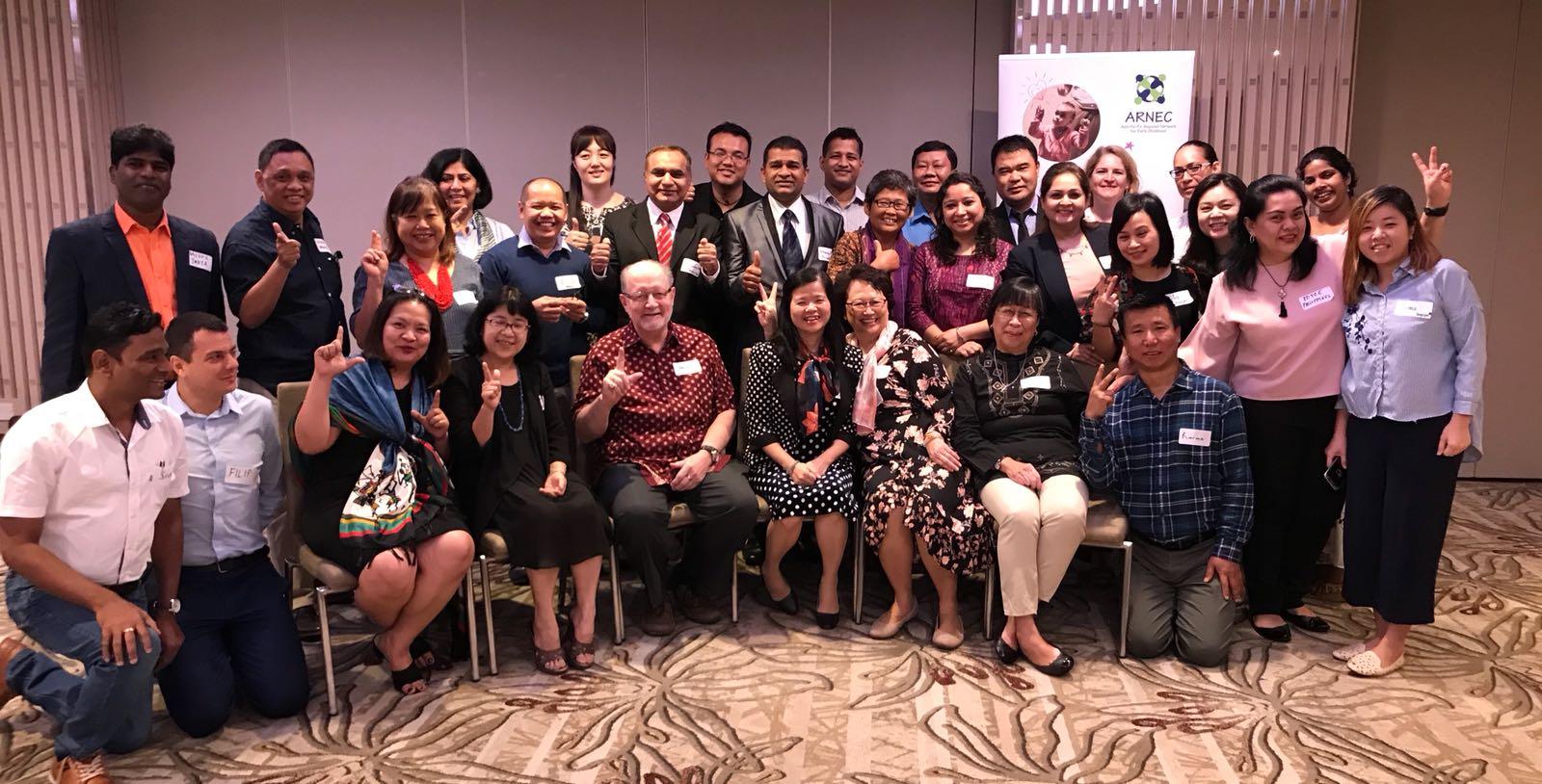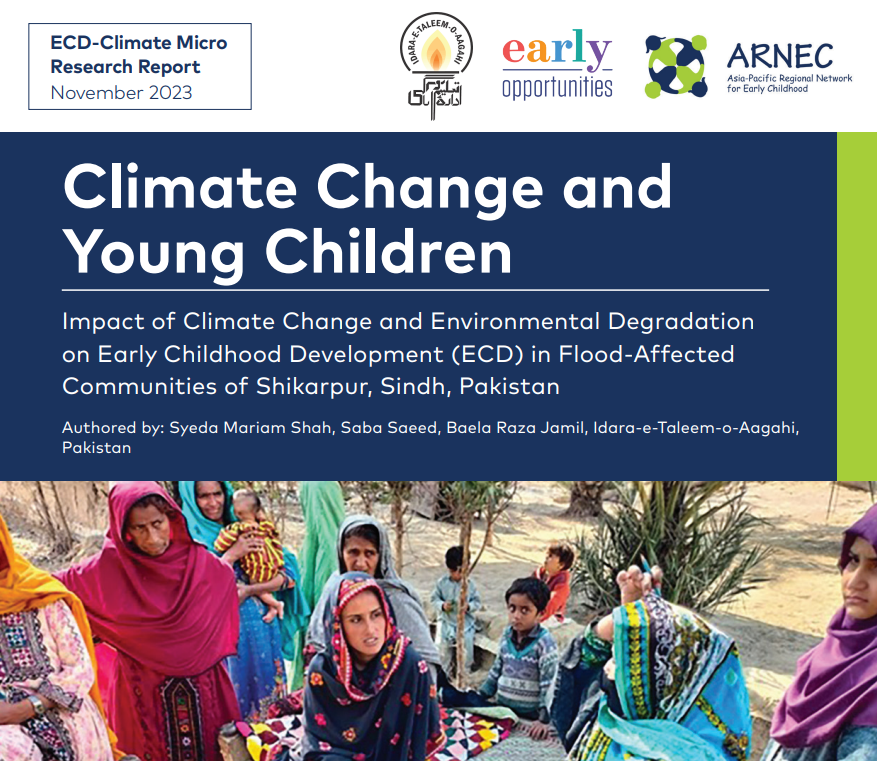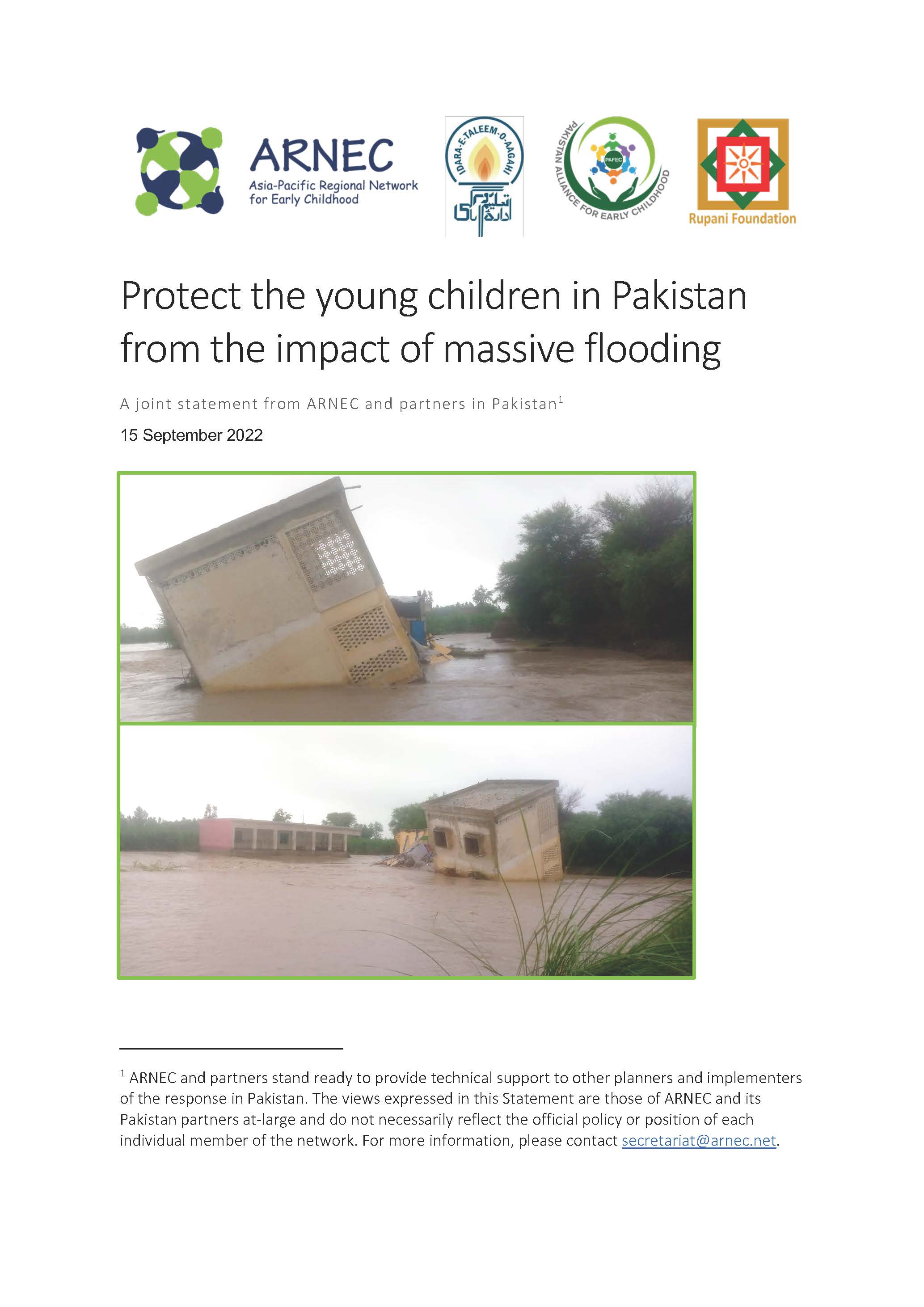Pakistan

The term ECE is generally used in Pakistan to refer to “katchi” or one-year pre-primary education in public schools for children between 3 and 5 years of age (in private settings, children 3-6 years undergo 3 years of education, mostly in the form of Kindergarten or Montessori). Following the 18th amendment in the constitution, ECE is under the responsibility of the provinces - some of which have developed clear ECE policies and plans.
The National Education Policy 2009 states that ECE shall be based on a concept of holistic children development through stimulating, interactive environment, including play. At least one-year of preprimary education shall be provided by the State and universal access to ECE shall be ensured within the next ten years in all public schools. The first formal ECE Curriculum developed in 2002, and revised in 2007, provided policy and curricular guidelines pertaining to ECE in Pakistan.
Pakistan has elevated its attention on children in the recent years. Under-five mortality rates have declined. The Government has also taken measures to establish a National Emergency Plan for Polio Eradication in 2014 with a clear priority on halting polio among all children.
Challenges
- Lack of access to public ECE programs in the rural areas.
- Low ECE policy prioritization with primary focus placed on formal primary schooling.
- Low ECE demand from parents and unwillingness to take advantage of private ECE provision.
Priorities
- Encourage wider participation of children age 3-5 in ECE programs, including one year of universal access to State-provided pre-primary education.
- Improve holistic ECE quality by requiring teachers to undergo two-year specialized training on the revised ECE National Curriculum.
- Improve governance of ECE programs by attaching ECE to primary schools with increased resources.
Stay tuned as we'll be publishing the updated Country Profile soon.
Ministries in charge
Provincial Ministries/Departments of Education (in Sindh, Punjab, Khyber Pakhtoon Khawa, and Balochistan). Ministry of Federal Education and Professional Training coordinates national policies since the devolution of the education ministry to the provinces. Scaling Up Nutrition Secretariat, Ministry of Planning and Reforms, Government of Pakistan.
Key Policies
ECD-specific national policy is not available. Policies related to ECD are referenced within the National Education Policy (1998-2010).
- National Education Policy (revised in 2009)
- Punjab ECE Policy 2017
- Provincial ECE Policy of Sindh (draft) (2014)
- Provincial Education Sector Plans of Sindh (2014-2018)
- National Plan of Action for Education for All (2001-2015)
National ECD Network
National Representative

ARNEC NATIONAL REPRESENTATIVES FOR PAKISTAN
MR GHULAM NABI
GN.NABILEG@GMAIL.COM
MR. IMTIAZ ALAM
IMTIAZALAM77@GMAIL.COM
Noteworthy Practices
1. Community engagement for inclusive ECE (Implemented by Aga Khan Education Services Pakistan or AKESP)
- Noteworthy aspects: Introduction of early learning by involving parents/communities in hard-to-reach areas of Gilgit Balitistan. Strategies include individualized attention to children, multilingual teachers, resourceful environment, and addressing the needs of differently-abled children.
- Achievements: Children has greater appreciation for diversity, positive self-identifies, confidence, and positive learning outcomes.
2. ECD in Public Sector Consolidated Schools (Implemented by Shaheed Zulfiqar Ali Bhutto Shaheed Institute of Science and Technology)
- Noteworthy aspects: ECD center established in a rural area, Shaheed Benazirabad, by a private university in public consolidated school with the support of Sindh Government. 3-year ECD program instead of a formal one-year Katchi class in public schools. Strategies include personalized attention to children, government teachers trained and engaged, preferences given to children from low income group.
- Achievements: Greater engagement of government officials. Children are better engaged, open to diversity, and have positive learning outcomes. Overall trust on public sector improved.
3. Ensure the Best Start in Life for Children (implemented by Institute for Development Studies and Practices)
- Noteworthy aspects: Program implemented in 30 government primary schools in Quetta Balochistan with AusAID funding. 3-prong focus: enhance learning abilities of children in the early years, develop capacities of key stakeholders (including teacher training and mentoring program), and increase involvement of community in ECD interventions (policy dialogues at local and national levels).
- Achievements: Increased gender parity, participation, and sustainability of community interventions. Enhanced parents’ awareness on brain development, child nutrition needs, prenatal and postnatal care, responsive caregiving, and importance of holistic development through play.
4. Releasing Confidence and Creativity (RCC) Program for early foundations (implemented by Aga Khan Foundation Pakistan)
- Noteworthy aspects: Program formalizes “katchi” or government preschool classes by incorporating a range of child-friendly supportive systems from educators, parents, community, and government for children’s holistic development.
- Achievements: Increased retention rates to 95% and overall positive learning outcomes in children through enhancement in teachers’ capacity.
5. Formal ECD Network for impact (supported by Rupani Foundation)
- Noteworthy aspects: Creation of a formal national alliance of ECD organizations for mutual learning and support to promote ECD.
- Achievements: Alignment between major ECD stakeholders in country to successfully work with the government to influence national policy for holistic ECD.
Latest Resources
Lorem ipsum dolor sit amet, consectetur adipiscing elit. Aliquam at porttitor sem. Aliquam erat volutpat. Donec placerat nisl magna, et faucibus arcu condimentum sed.

